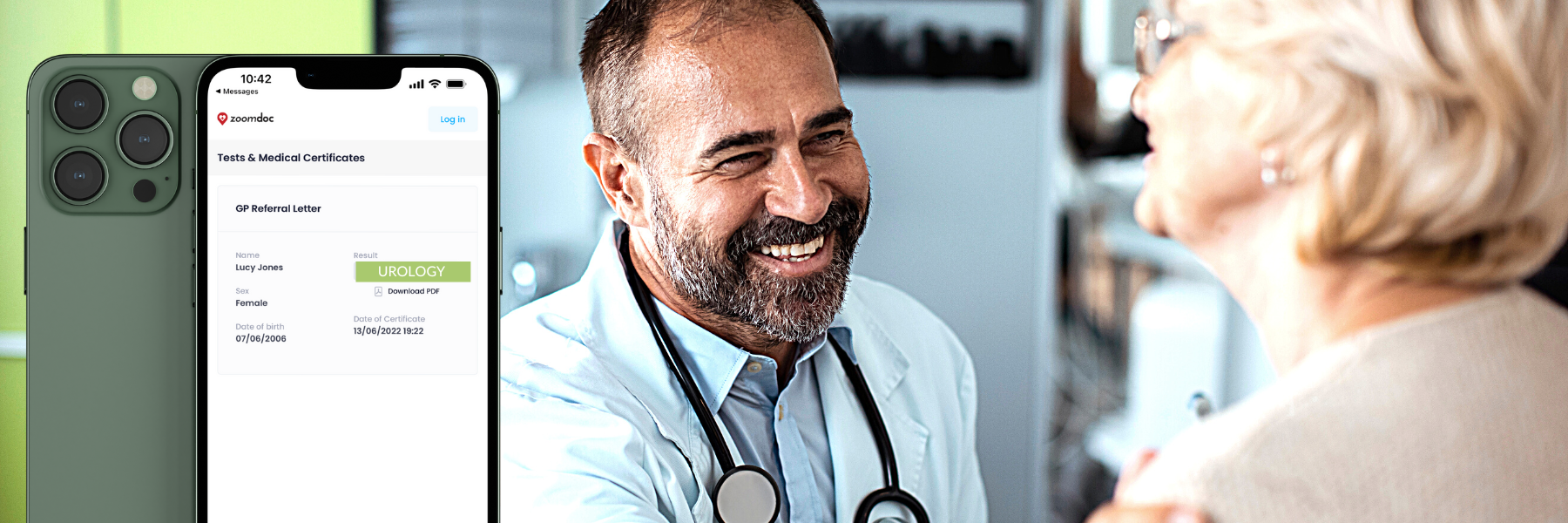From the symptoms to be aware of, to sharing them with the doctor
TV presenter Jonnie Irwin’s terminal lung cancer diagnosis was particularly devastating to read about this week. Just 49 years old, he has three children under the age of three and a prognosis of six months to live. His diagnosis is reminiscent of ‘Bowel Babe’ Dame Deborah James – a radio and podcast presenter and young mum, who bravely documented her battle with terminal bowel cancer in the years leading up to her death this year, raising money and awareness to stop others suffering as she did.

1 in 13 UK males and 1 in 15 UK females will be diagnosed with lung cancer in their lifetime.
Cancer is, quite literally, a killer – it’s the leading cause of death here in the UK, accounting for one in every four (deaths), according to Cancer Research UK – but it doesn’t have to be.
The NHS says 1 in 2 of us will develop some form of cancer during our lifetime. But, being able to spot the warning signs and aware of your risk factor can help you not only catch it early, but also increase your chances of beating it completely, or at least living with cancer, rather than dying from it.
‘These days, so many cancers are treatable, but getting them diagnosed in the early stages is key when it comes to improving your survival chances,’ says ZoomDoc Chief Medical Officer, Dr Kenny Livingstone.
‘If you notice anything unusual – like unexpected weight loss, new lumps, unexplained bleeding or blurred vision – see your doctor ASAP, especially if a family member has had cancer, as many can be hereditary, increasing your risk,’ he adds.
In the meantime, as well as eating sensibly, exercising regularly and not smoking to stay as healthy as possible, make sure you’re aware of these key symptoms of the four most common cancers (source: NHS), here in the UK.
And spread the word – because it could save someone’s life.
Breast cancer
We’ve all got much better at checking our breasts regularly thanks to celebrity-backed awareness campaigns that run every October. But don’t leave it until next year to check yours again.
According to the NHS, breast cancer affects about 1 in 8 women but ‘there’s a good chance of recovery if it’s detected at an early stage.’

Breast cancer is the most common cancer in the UK, with roughly 1 in 8 women diagnosed at some point in their lifetime.
NHS advice says to see your doctor if you notice any of the following symptoms:
- a new lump or area of thickened tissue in either breast that wasn’t there before
- a change in the size or shape of one or both breasts
- a discharge of fluid from either of your nipples
- a lump or swelling in either of your armpits
- a change in the look or feel of your skin, such as puckering or dimpling, a rash or redness
- a rash (like eczema), crusting, scaly or itchy skin or redness on or around your nipple
- a change in the appearance of your nipple, such as becoming sunken into your breast.
Read more about breast cancer here
Lung cancer
While the majority of those diagnosed with lung cancer are smokers, it can also affect non-smokers and what’s more, it doesn’t always present with a cough. TV presenter Jonnie Irwin was diagnosed after seeing a doctor for blurry vision, possibly caused by the cancer having already spread to his brain. Although it can affect younger people as with Jonnie, 40% of cases are in people over the age of 75.
According to the NHS, ‘there are usually no signs or symptoms in the early stages of lung cancer.’ However, it lists these as the main symptoms associated with lung cancer:
- a cough that doesn’t go away after 3 weeks
- a long-standing cough that gets worse
- chest infections that keep coming back
- coughing up blood
- an ache or pain when breathing or coughing
- persistent breathlessness
- persistent tiredness or lack of energy
- loss of appetite or unexplained weight loss.
Other less common symptoms include a hoarse voice, wheezing and difficulty swallowing.
Always see a doctor if you’re experiencing any of these symptoms.
Bowel cancer
Bowel cancer usually affects people over the age of 50, but Dame Deborah James was just 35 when she was diagnosed and 40 when she died.
According to Bowel Cancer UK:
‘Bowel cancer is treatable and curable especially if diagnosed early. Nearly everyone survives bowel cancer if diagnosed at the earliest stage. However this drops significantly as the disease develops. Early diagnosis really does save lives.’

Some signs of Bowel Cancer: Blood in the stools (faeces), a change in bowel habit, such as more frequent, looser stools, and abdominal (tummy) pain.
Unfortunately by the time Dame Deborah’s cancer was diagnosed, hers was already stage 3, soon becoming stage 4 and too advanced for treatment.
Together with Bowel Cancer UK, she helped raise awareness of these key symptoms to look out for so others can survive this particular cancer.
They include:
- bleeding from your bottom and/or blood in your poo
- a persistent and unexplained change in bowel habit
- unexplained weight loss
- extreme tiredness for no obvious reason
- a pain or lump in your tummy.
Of course, many of these symptoms could be caused by other conditions like IBS, colitis, Crohn’s disease but the earlier you can catch bowel cancer, the better, so always get them checked out.
Prostate cancer
Prostate cancer is one of the top four most common cancers in this country, affecting 1 in 8 men in their lifetime, says Prostate Cancer UK. Unlike the other cancers mentioned, you’re unlikely to notice specific symptoms with prostate cancer in its early stages.
Although the NHS always advises getting any unusual symptoms checked out – such as an increased need to pee – knowing your risk factor is an important part of prostate cancer awareness and diagnosis.
According to Prostate Cancer UK, the three main risks to be aware of are:
- getting older – it mainly affects men aged 50 or over
- having a family history of prostate cancer
- being black.
Read more about prostate cancer here
Worried it’s cancer? Here’s how to talk to your GP about it
It’s not always easy to tell your doctor about what’s worrying you, especially if you’ve convinced yourself you’re going to die from your own googling of the symptom.
‘I can promise you, there’s no symptom that can embarrass GPs. We’ve most likely heard it or seen it before and the sooner we hear what’s troubling you, the sooner you could get it ruled out – or, if it is cancer, start treatment,’ says Dr Kenny.
Here are his tips for making sure you get what’s really bothering you out in the open during a doctor’s appointment.
- Write it down – read what you’ve written out to the doctor or even pass your notes over for them to read, if you prefer.
- Take someone with you – if it’s easier, take some moral support with you to make sure you don’t skirt around the symptoms you really need to discuss.
- Tell the receptionist – if you’re nervous about saying something face-to-face, tell the receptionist or ask for an initial phone consultation, which may take the edge off whatever the issue is when you go in for a follow-up in person appointment.
- Use ZoomDoc – we offer video calls via our app to provide an appointment that suits you from the comfort of your own home. You may have to still make a face-to-face appointment to have the symptoms looked at but at least you’ll have got the problem off your chest and in the system.
Second opinion? ZoomDoc can help
If you’re fortunate enough to have private medical insurance and want to use that to get a second opinion or see a specialist sooner, ZoomDoc can help speed up the process with our GP referral letter.
Simply order yours here for a same-day letter for just £35 – no need for a doctor’s appointment – and you can book to see your specialist ASAP with no further hold up.



